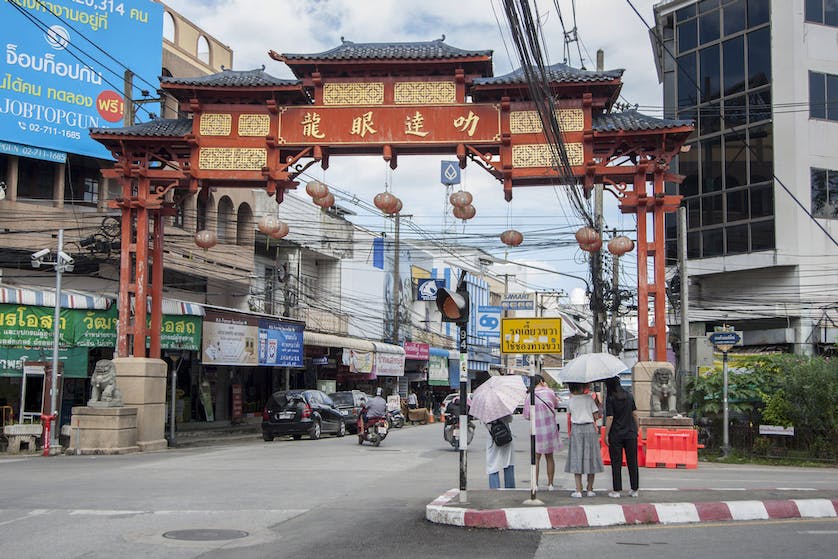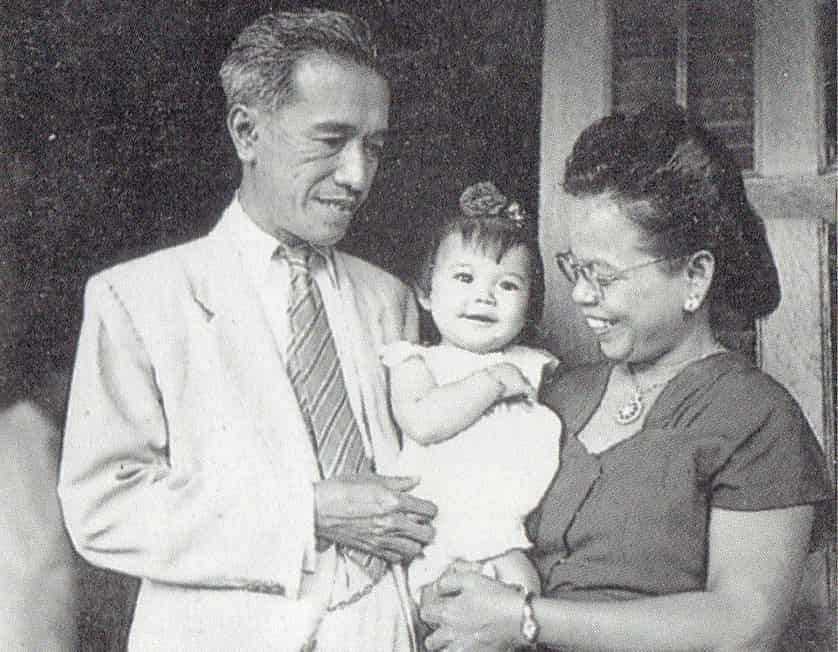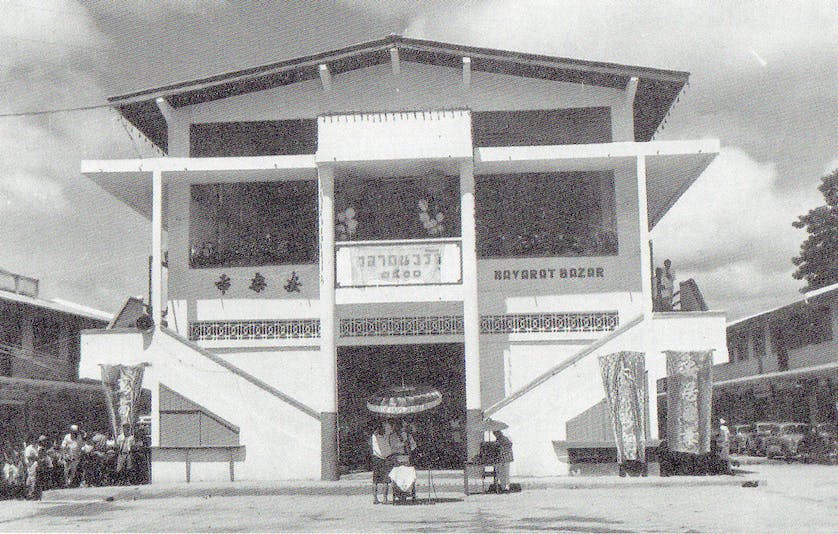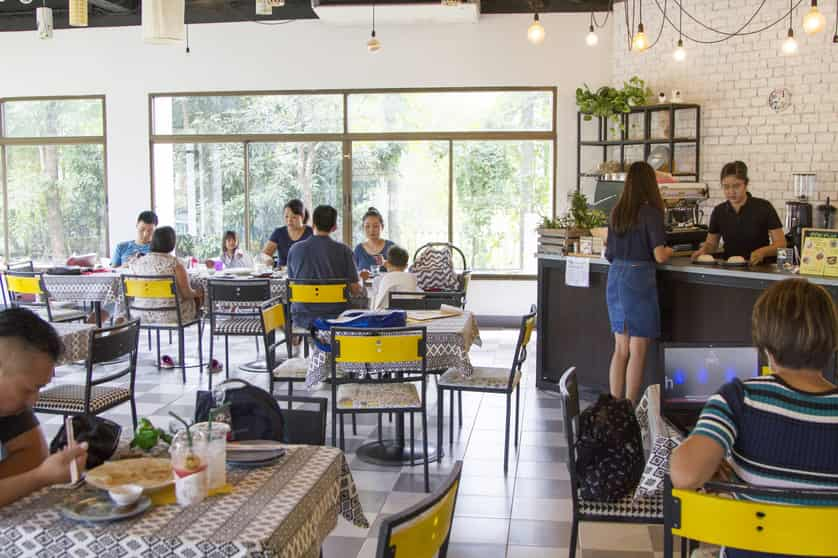Cicada Club’s club house in Mae Hia’s Koolpunt Ville, is both a cafe and day care centre for Chinese expats. I sit down with Coco Huang, the club house’s owner along with a group of Chinese women who tell me that they all first heard about Chiang Mai from the film Lost in Thailand. They were talking about the 2013 Chinese mega hit comedy a la The Hangover, about three men travelling to Thailand which became the first film to earn over one billion Yuan at the Chinese box office. As a local Thai, I was well aware of the increase in Chinese visitors to our city following the release of the film and understood the power of that phenomenon — the sudden influx of tourists who, to a large extent, were unlike any tourists we had ever experienced before in terms of sheer numbers and behaviour. Most of us in Chiang Mai agree that this influx was great for business, but at the same time these novice travellers often made national news for what the public deemed as a wide range of faux-pas. I’ll admit that I too, at one point began to feel frustrated at their behaviour, conveniently forgetting my own Chinese heritage. I then noticed that all the talk was focused on tourists, and I began to wonder about the Chinese who live here permanently, wanting to learn more about who they are, what they do and where they came from. After all, there are over two million Thai-Chinese people in Northern Thailand, a region with 11.6 million people, so where did it all begin and what is their story.
Of Kings and Emperors
“King Mungrai the founder of Chiang Mai was born mixed race, with his father being of the Lua tribe and his mother a Tai Lue from a family which came from Xishuangbanna in Southern China. One of the main reasons he built Chiang Mai was to create an offshoot from the lucrative Silk Road during the Yuan Dynasty,” explained Vithi Phanichphant, a dedicated historian and a highly respected authority on northern Thai culture. “At the time it was the Mongols who had control of all the trade along the Silk Road reaching south as far as Bagan in Myanmar, an important city as it was a doorway to the Bengal Bay. Before Mungrai became king, the young prince travelled south towards what is now known as Northern Thailand, building cities along the way in a bid to create his own path to connect with the Silk Road in China. In 1243 he conquered Kengtung and by 1259 he succeeded his father and became the first king of the Unified Tai City States. During this time he continued south, building and conquering cities such as Chiang Rai and Fang. Following his successful conquest of Lamphun, he then built Wiang Kum Kam before finally founding Chiang Mai in 1296.”
Around the same time the Sukothai Kingdom was emerging as a regional power, and during the mid to late 13th century emissaries began travelling between China and Sukothai, according to the Tia Eia Chiang Mai Chinese Association 40th Anniversary Encyclopaedia, resulting in a great number of South Chinese migrants putting down roots in what is now Thailand. “The logging industry was overtaken by Chinese agencies, who then distributed the logs to Sukothai to process,” added Vithi. During the Ayutthaya era many Hokkiens from Southern China served as administrators in the kingdom. Later when King Taksin, the son of a Teochew noble, ruled the short-lived 18th century Thonburi Kingdom, he attracted a great influx of Chinese Teochew people.

The growing nation of Siam that would one day become Thailand, became populated with great numbers of Chinese people, from nobles to labourers, many of whom slowly naturalised into the evolving Thai creed and culture. By the mid-19th to early-20th century, another wave of Chinese people entered Siam, this time as labourers looking for work, escaping the poverty-stricken provinces of China as it began to battle with a fast growing population, western imperialism and growing political unrest. At that time, King Rama I, who had succeeded the throne from King Taksin, continued to trade with the Chinese. Many of Siam’s Chinese immigrants at that time had migrated south and lived along the eastern coast, only began moving north again after the railway network expanded north in 1921.
Culturally, northern Thailand shares many traditions with the Chinese, some more obvious than others. The Tia Eia Chiang Mai Chinese Association 40th Anniversary Encyclopaedia identifies traditions such as the Vegetarian Festival, the Moon Festival and the Spirit Festival as direct imports from China. Even the way we worship at Buddhist temples is influenced by Chinese culture. “In Thailand we are taught that we can pray at any temple and get the same results,” said Vithi. “However when it comes to the Chinese Zodiac, we believe that praying at the temple dedicated to our birth sign will bring us better merit. This is an entirely Chinese concept commonly believed by many Thais.”
Retuning to Chiang Mai
In 1921 Ou Xiaotang, the son of a powerful Chinese migrant family moved to Bangkok from Guangdong, China and eventually chose to relocate to Chiang Mai to work as a clerk. The young entrepreneur opened a gold shop on Wichayanon Road and later expanded his business by opening a gun shop. He soon became the main distributor for Boon Rawd Brewery in the north of Thailand, a position that granted him a chance to become a shareholder in Singha Beer. In 1943 he acquired Thai nationality and changed his surname to Osthaphan. By the end of his working life, he was one of Chiang Mai’s most successful businessmen, owning a rice mill, a wood processing plant, an ice factory, a gas station and a branch of Kasikorn Bank, among many other ventures.

It was at this point in time when historians say the wealth shifted from the hands of Chiang Mai’s rulers into those of foreigners, notably Chinese hands. It was Ou who secured his bid on the home of the last ruler of Chiang Mai, Prince Kaew Nawarat, after a drawn out court battle with another interested Thai citizen of Pakistani descent. In 1945 the palace was bought for 180,000 baht and two years later it was transformed into the Nawarat Market. As the city grew so did the markets. Large numbers of Indian and Pakistani immigrants settled and became naturalised, along with many more Chinese business people. At the time of his death, Ou had 21 children, each expanding his legacy across Thailand. Many descendants of those children live in Chiang Mai today and the surname has become synonymous with wealth and success.
Following the Second World War and the growing nationalistic attitudes and policies of the Thai government, Chinese migration slowed, mainly due to new immigration legislations. “It was only about ten years ago that Thailand started reaching out to China in a big way again,” said Li ‘Yim’ Xiaojuan, the Chinese editor of Guidelines Travel by Compass Magazine. Yim is a Chinese national from the Xishuangbanna Dai Autonomous Prefecture. “The Lampang Intertech College was one of the first government institutions to offer programmes to Chinese nationals to come to Thailand and study Thai and then peruse further education in the Kingdom. When I started there were around 150 of us, many of whom decided to stay on and seek employment after graduation.”
From graduation to around the time Lost in Thailand was released Yim saw only a small number of Chinese tourists in Chiang Mai, some of whom hired her off the books to be a guide — after all there were no Chinese speaking guides at that time, and she knew the city well. “At that time Thailand still didn’t have its eye on Chinese tourists,” Yim explained. “Those who travelled here were experienced travellers. Suddenly our economy started to boom and people had more money to travel overseas. This, paired with the rise of social media and the film Lost in Thailand, saw Chiang Mai become the perfect tourist destination for the Chinese.”

A Growing Wave
To anyone who is familiar with Chiang Mai, it is clear how much the city has changed in the last five years. Chinese businesses are opening up and more Thai business owners are marketing to Chinese tourists, with some even giving up completely on tourists from other nationalities. According to Wei ‘Miao’ Run Xiang, a 29 year old business owner, it was this wave of tourists that brought along a new boom of Chinese nationals looking for business opportunities. “After visiting Chiang Mai on holiday I saw a great opportunity,” she explained. “Things were cheap and the number of Chinese tourists was massive so I quit my job as a pharmacist and moved to Chiang Mai permanently. Now I own a business that is connected to thousands of Chinese nationals who have visited Thailand and want Thai products sent to them back at home. I have sold cosmetics, clothes, mattresses and even condos!”
Miao fits perfectly into the new type of Chinese migrant: Well-educated and female. According to research by the Mahidol University’s Institute for Population and Social Research, this current wave of Chinese migrants are seeking economic opportunity instead of economic survival. In 2015, almost 19,000 Chinese nationals obtained work permits, double that of pre-Lost in Thailand days.

But according to Yim, this is just the beginning. “There are so many Chinese people just waiting to explore the world,” she said. “It is our culture that is holding us back most. Many Chinese are nervous about travelling abroad but that attitude is changing and when it does, millions more Chinese will pour out and settle across the world.”
According to a recent interview in the publication The North in July 2017 with Ren Yisheng, the Consul General of the Chiang Mai Consular Office of The Consulate General of the People’s Republic of China, there are over 137 million Chinese people already living and working abroad, a number that is only increasing. Currently there are 30,000 Chinese people studying in Thailand, 1,200 of whom are in Chiang Mai, he stated.
As I sat at the daycare cafe I listened to the women talking about why they were here. For some it was because of work, but for most it was to give an alternative life to their children. “The Chinese government grooms our children. My husband and I don’t agree with their policies. International schools in China are also very expensive, so we thought why not come to Thailand and try our luck here. After all, we just want to give our child the best education that we can afford,” said Nanzy Zhang, a mother of an 8 year old who is from Shanghai. “We will stay here until our children graduate at least, and then see where they want to go. Maybe they will stay here so we will too, but if they move away we may have to go with them,” added Limin Hou, one of many women I talked to who followed their children’s wishes to move to Chiang Mai, leaving their husbands to earn a living.
For centuries there have been wave upon wave of Chinese migrants who have settled permanently into Chiang Mai and beyond. We are now witnessing a movement which our ancestors have witnessed countless times before. And if Yim’s predictions are correct, then we are only witnessing the tip of what is to come.
